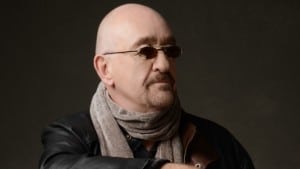With an acclaimed solo career, famous guest spots on iconic recordings (The Rolling Stones, Jimi Hendrix, Fleetwood Mac!), and a coveted spot in the Rock and Roll Hall of Fame as a founding member of Traffic, Dave Mason is a walking, talking piece of music history. In anticipa-tion of his Dec. 2 at The Coach House, the English guitar legend talked about early influences, recording with George Harrison, and his current tour.
CGL: These show’s coming up are part of the Alone Together Again Tour, where you’re playing the album (1970’s Alone Together) in it’s entirety. What made you decide to do that?
DM: Partly because I’ve never played the whole album [laughs], but also, it became such a classic album, and a lot of people out there know it. We’re also gonna segue into some Traffic songs and stuff from my solo career. I’ve re-recorded the whole album, and frankly it’s better than the original. The CD is multi-colored like the original multi-colored vinyl, with the same fold-out sleeve.
CGL: Tell me about that famous marble vinyl. Was that your idea?
DM: Well it was originally supposed to come out like a sunburst, but there was no controlling the colors in the presses, so every one of them came out different, looking like a bowling ball, or like somebody just threw up [laughs].
CGL: What can you tell me about this band you’ve put together?
DM: Johnne Sambataro (guitar/vocals) he’s been with me on and off for 30 plus years, my drummer, Alvino Bennett, has been there 12-13 years, Tony Patler (keyboards/bass) has been around for six years, and they’ve all played with a lot of different musicians, they have great track records of their own. It’s a great little unit, very talented people.
CGL: Let’s go back a ways. What was the moment when you said, “I have to play music”?
DM: [laughs] I don’t know. Learning to play guitar seemed like a good idea. I was born in 1946, at the beginning of rock-n-roll, so that whole thing caught me. I loved The Shadows, Hank Marvin was my guy. At 14 and 15, I loved Duane Eddy, The Ventures, then I got older and more into music and I got into the blues, the litany of all the great blues guitar players. There would be no Dave Mason, no Eric Clapton, if it weren’t for people like B.B. King or Buddy Guy. The British Invasion is actually an American story. That’s where we got it all from.
CGL: I’m not going to ask you when Traffic is getting back together. Instead, is it strange to you that this band you were in for two years when you were a young kid still looms so large in your career?
DM: It was just great music. There were some great songs in there and they still hold up. It’s like great jazz or blues, or even classical, if it’s good, it lasts. I’m a big proponent of authenticity, in everything. If you’re authentic in what you do, it doesn’t matter what age you are. People will get it. Traffic had very diverse musical tastes in there, we incorporated everything. Pop, jazz, blues, gospel. You name it, it was in there. Traffic is sort of one of the original alternative bands.
CGL: How did you wind up playing on George Harrison’s All Things Must Pass (1970)?
DM: In England, pretty much everybody finished up in London. Unlike America, which had a number of musical centers, we only had one. I got to know (Paul) McCartney because the lady I was with at the time was designing some furniture for him. So I would go to Abbey Road some-times, especially when they were cutting Sgt. Pepper, and I got to know them, and I got to know George and he gave me my first sitar. He invited me to come and be one of the many players that were on All Things Must Pass.
CGL: Was Phil Spector around at all when you were recording?
DM: Oh yeah, Phil Spector was there with his . 38 revolver sitting on the console [laughs].
CGL: Were you on the same Delaney and Bonnie tour as George?
DM: No, but Delaney and Bonnie did a show at Croydon Hall in England, and George came down to the show. I showed him a little part I played on that song, “Comin’ Home,” because he said, ‘’Well what am I gonna play?’’ I said, ‘’Here, this is really simple, it’s a slide part.’’ He said, ‘‘I don’t really know how to play slide guitar, but show me what it is.’’ A few years back I read an article where he said that what I showed him led him to do that guitar style of his that he used so often.
CGL: Have you ever thought about writing a book? I mean, you knew everybody.
DM: [laughs] If I had a dollar for everybody on Facebook that keeps asking me about a book, I wouldn’t need to write the book! This is the problem. Someone in an interview will ask me, ‘‘What was your first gig?’’ And I say, ‘‘God, I have no idea. I don’t remember!’’ My memory for specific times and places is not that great. It’s all been one long event for me. Maybe I’ll write it one day when I’m sitting in a rocking chair and can’t get out of it.
CGL: Your twitter bio says “Rock and roll is an attitude, not an age.” What does that mean to you?
DM: What that means is, if I can’t still conjure up that 15 year-old kid, learning guitar, then it’s time to stop. I love playing and I love making music. And I can still do it, so why not.
